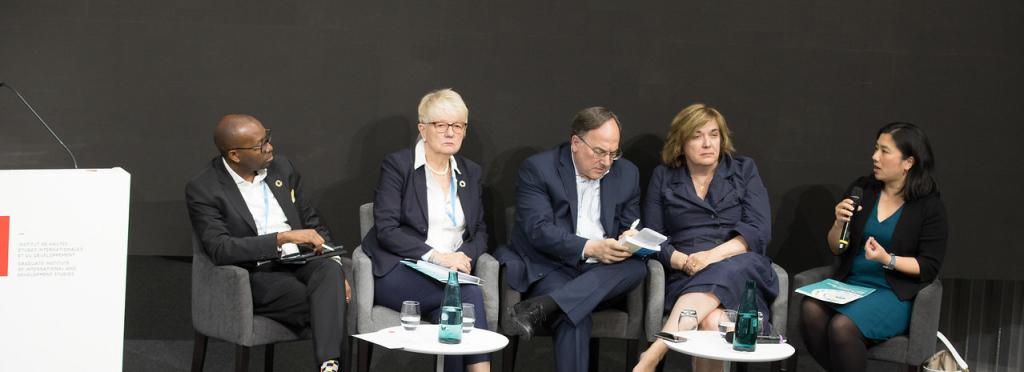UHC Key Asks
The Sustainable Development Goals set an ambitious agenda for 2030 and UHC represents a key priority towards a sustainable future. Even if multiple countries make continuous progress on the road to UHC, millions of people still lack access to basic health care. In order to gather and accelerate efforts towards this common goal, the International Health Partnership for UHC2030 developed a set of Key Asks for the 2019 UN High-Level Meeting on UHC. This global gathering that will take place on 23 September 2019 invites all health actors to unite their agendas under a decisive theme. Launched in April 2019, the Key Asks provide guidance to all health partners while coordinating their global efforts through 6 strategies: ensure political leadership beyond health; leave no one behind; regulate and legislate; uphold quality of care; invest more, invest better; move together.
On 6 May 2019, the Global Health Centre and UHC2030 opened a reflexion on the UHC Key Asks in order to stimulate multi-stakeholder dialogues among the health community. Invited experts identified UHC as a social contract that implies sharing and redistribution, and builds society based on an expression of solidarity. The panellists also pinpointed some controversial areas that tend to create disagreement between Member States. Issues such as sexual and reproductive health and rights, the public financing of health systems and the rights of migrants and refugees need to be addressed more clearly in order to ensure global progress. They insisted on the fact that a common language and trust must be built between public actors and the private sectors.
UHC and the New Health Economy
UHC has been the principal theme of multiple debates in Geneva during the World Health Assembly in May. The Global Health Centre and Rabin Martin carried UHC reflections further on 23 May 2019 as they launched the recent book “The Road to Universal Health Coverage: Innovation, Equity and the New Health Economy” co-edited by Jeffrey L. Sturchio, Ilona Kickbusch, and Louis Galambos.
As countries are advancing towards UHC, they face significant challenges at different economic levels. The panellists explored multiple success factors and approaches which have the capacity to overcome barriers to UHC. The discussion highlighted the influential role of women in creating healthy economies as they represent both users and providers of healthcare.
The private sector which tends to be perceived as a controversial factor was presented as a pathway to faster economic growth. Public-private partnerships have already generated visible results in the past, for instance in HIV crises, and similar collaborations are likely to play a determinant role in the UHC movement until 2030. Moreover, the private sector has the ability to create new jobs for health workers and improving the health workforce directly strengthens progress towards UHC.
The panel discussion called for a collaboration and cooperation between the health sector, the private sector, governments, civil society, academia and other partners in order to increase opportunities and co-create efficient solutions.
Further Information
- Moving Forward Together: Key Asks from the UHC Movement for the UN HLM
- Video Recording of the panel discussion on the UHC Key Asks
- Moving Together to Build a Healthier World: Key Asks from the UHC Movement
- The Road to Universal Health Coverage: Innovation, Equity and the New Health Economy
- Video Recording of Book Launch ‘The Road to UHC’


